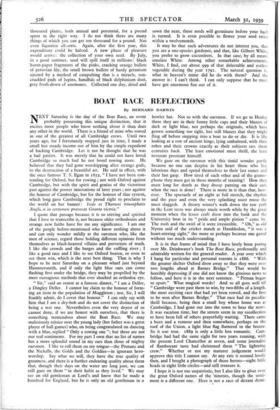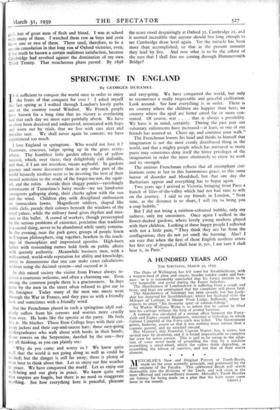BOAT RACE REFLECTIONS
By BERNARD DARWIN
NEXT Saturday is the day of the Boat Race, an event probably possessing this unique distinction, that it excites more people who know nothing about it than does any other in the world. There is a friend of mine who rowed in one of the greatest of all Cambridge crews. Until two years ago, for I fortunately stopped just in time, I made a small but steady income out of him by the simple expedient of backing Cambridge. Let it not be thought that he was a bad patriot. It was merely that he could not have loved Cambridge so much had he not loved rowing more. He believed that they had gone worshipping after strange gods, to the destruction of a beautiful art. He said in effect, with the once famous T. S. Egan in 1852, " I have not been con- tending for Oxford, but for rowing ; not with Oxford against Cambridge, but with the spirit and genius of the victorious past against the poorer innovations of later years ; not against the honour of Cambridge, but for the honour of that system, which long gave Cambridge the proud right to proclaim to the world on her banner: Iside et Thamesi triumphatis Anglic..n in certamen provocat Granta victrix."
I quote that passage because it is so stirring and spirited that I love to transcribe it, not because older orthodoxies and strange new faiths have for me any significance. I am one of the people before-mentioned who know nothing about it and can only wonder mildly at the oarsmen who, like the men of science, regard those holding different opinions from themselves as black-hearted villains and perverters of truth. I like the crowds and the barges and the ruffling river ; I like a good race and I like to see Oxford beaten, or even to see them win, which is the next best thing. That is why I hope to be next Saturday on a pleasant wharf just beyond Hammersmith, and if only the light blue oars can come flashing first under the bridge, they may be propelled by the most outrageous methods that ever shocked an orthodox eye.
" Sir," said an orator at a famous dinner, " I am a Deller, a Dingley Deller. I cannot lay claim to the honour of form- ing an item in the population of Muggleton ; nor, Sir, I will frankly admit, do I covet that honour." I can only say with him that I am a dry-bob and do not covet the distinction of being a wet one. Nevertheless even the very dryest of us cannot deny, if we are honest with ourselves, that there is something tremendous about the Boat Race. We may maliciously rejoice over the young lady (her father was a great player of ball games) who, on being congratulated on dancing with a blue, replied " Only a rowing one "; but these are not our real sentiments. For my part I own that no list of names has a more splendid sound in my ears than those of mighty oarsmen. I like to roll them on my tongue—the Pitmans and the Nickalls, the Golds and the Goldies—in ignorant hero- worship. Say what we will, they have the true quality of greatness, and there is a further endearing quality about them that, though their days on the water are long past, we can still gaze on them " in their habit as they lived." We may see an old gentleman at Lord's and know that he made a hundred for England, but he is only an old gentleman in a bowler hat. Not so with the oarsmen. If we go to Henley there they are in their funny little caps and their blazers of dark or light blue, not perhaps the originals, which have grown something too tight, but still blazers that they might fling off before stepping into a boat to do or die. It is like looking at a row of ancient kings, lying embalmed, with their robes and their crowns exactly as their subjects saw them centuries back. The least emotional must thrill, the least reverent prostrate himself.
We gaze on the oarsmen with this timid wonder partly because no one can despise in his heart those who live laborious days and spend themselves to their last ounce and their last gasp. How tired of each other and of the gramo- phone they must get in those months of training ! How they must long for death as they droop panting on their oars when the race is done! There is more in it than that, how- ever. The spectacle of an eight at full stretch, the rhythm and the pace and even the very splashing must rouse the must sluggish. A dreary winter's walk down the tow path in the Lent term was always made worth while by the great moment when the lesser craft drew into the bank and the University boat in its " pride and ample pinion " came by. The rush and the swirl of it were irresistible. " Oh," as old Nyren said of the cricket match at Hambledon, " it was a heart-stirring sight," the more so perhaps because one gazed without too much understanding.
It is in that frame of mind that I have lately been poring over Mr. Drinkwater's book The Boat Race, professedly and admirably written for the general reader. A year over which I hang for particular and personal reasons is 1886. " With the greater shelter Oxford drew away so that they were over two lengths ahead at Barnes Bridge." That would be horribly depressing if one did not know the glorious news to follow, and here it is in the next sentence. " Pitman began to spurt." What magical words! And so all goes well till " Cambridge went past them to win, by two-fifths of a length, the most exciting race that had yet been rowed, and the first to be won after Barnes Bridge." That race had its peculiar thrill because, being then a small boy whose home was at Cambridge, I had gone out into the town to hear the news. It was vacation time, but the streets seem in my recollection to have been full of others prayerfully waiting. There came a buzz and a rumour and then somewhere, perhaps on the roof of the Union, a light blue flag fluttered in the breeze. So it was true. 1889 is only a little less romantic. Cam- bridge had had the same eight for two years running, with the present Lord Chancellor at seven, and some journalist of flamboyant taste had christened them " The lightning crew." Whether or not my maturer judgement would approve this title I cannot say. At any rate it seemed lovely then, and I bought a photograph of those heroes—eight little heads in eight little circles—and still treasure it.
I hope it is not too unpatriotic, but I also like to gloat over the great Oxford names of the 'nineties, though the senti- ment is a different one. Here is not a race of distant demi- , gods but of great men of flesh and blood. I was at school with many of them. I watched them row as boys and even know one or two of them. There used, therefore, to be a cenain consolation in that long run of Oxford victories, even, if the truth be known a certain malicious satisfaction, because Cambridge had revolted against the domination of my own Third Trinity. That treacherous phase passed. By 1898 the score stood despairingly at Oxford 32, Cambridge 22, and it seemed incredible that anyone should live long enough to see Cambridge draw level again. Yet the miracle has been more than accomplished, so that at the present moment they lead by five. And now what is to be the colour of the oars that I shall first see coming through Hammersmith Bridge?



































































 Previous page
Previous page